News & Media
PVC Lekgotla charts a path forward for Unisa's future
The Principal and Vice-Chancellor (PVC) of Unisa, Prof Puleng LenkaBula, and the university's senior management recently concluded a strategic Lekgotla to reflect on the institution's implementation of its strategy and pave the way forward for the current academic year and beyond. The two-day Lekgotla took place in Benoni, East Rand, on Monday, 29 July, and Tuesday, 30 July 2024. The PVC convenes Makgotla annually to enable the Unisa leadership to address pertinent strategic issues impacting institutional academic and support environments.
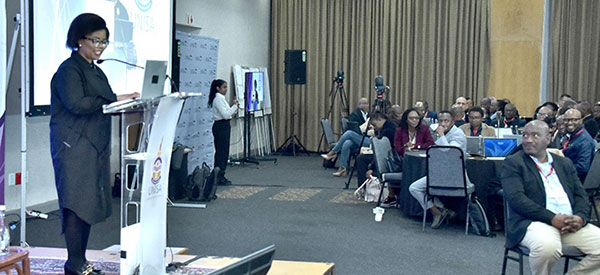
Principal and Vice-Chancellor of Unisa, Prof Puleng LenkaBula, delivers the opening address.
The July Lekgotla builds on the discussions and outcomes from the previous gathering in March. At that earlier event, significant issues were tackled, such as the increasingly competitive landscape of student recruitment, institutional achievements and strategic improvements. Highlights included introducing efficient ICT systems, rapid response times for attracting top applicants, and financial aid initiatives aimed at students nearing graduation. The Unisa Foundation played a crucial role in helping students with three or fewer modules left to complete their qualifications, while the Finance Department decreased the minimum payment flexibility to facilitate more registrations. Other notable achievements were the strides made by the Academic Development Open Virtual Hub (ADOVH) in reskilling students with digital 21st-century skills and the Directorate for Counselling and Career Development (DCCD) enhancing its services through in-person and virtual modes.
Opening the first day of the Lekgotla, the PVC underscored the importance of the event as a space for creative and critical reflection. She emphasised the necessity for robust, transparent and accountable leadership to navigate the complexities of the ever-evolving education sector. LenkaBula highlighted several key points in her opening address, stressing the critical need for resilient and ethical leadership to foster a culture of excellence and innovation at Unisa. She highlighted the importance of aligning strategic goals with resource allocation to meet the demands of students and stakeholders effectively. Emphasising diversity, equity and inclusion, she discussed strategies for recruiting and retaining a diverse body of students and staff.
The PVC also celebrated Unisa's rise in global rankings and its partnerships. She reinforced the institution's commitment to sustainable development. She called for tangible outcomes in catalytic niches, stressed the need for robust enrolment management, and underscored the importance of adapting teaching methods and student support to address diverse needs. Moreover, she emphasised prudent financial management and income diversification to ensure economic stability, highlighting Unisa's sustainability leadership at the Global Sustainable Development Congress 2024 in Bangkok. LenkaBula's address set the stage for the two-day deliberations, encouraging robust engagement and sharing of creative ideas to advance Unisa's vision of shaping futures in the service of humanity and around Unisa's catalytic niche areas.
Critical reflections
Following the PVC's address, attendees were invited to share their views, which included discussions on institutional change and culture, the importance of robust infrastructure and strategies for student retention. Critical action plans were identified and will be implemented, with campaigns underway to address issues such as plagiarism and academic dishonesty. Progress in institutional change and culture was noted, with health and wellness initiatives extended to the Sunnyside Campus and resource sustainability efforts in regional campuses. Respondents emphasised the need for Unisa to position itself alongside top institutions like Harvard. They highlighted issues around enrolment management, including developing bridging courses, collaborating with TVET colleges and improving student support on regional campuses.
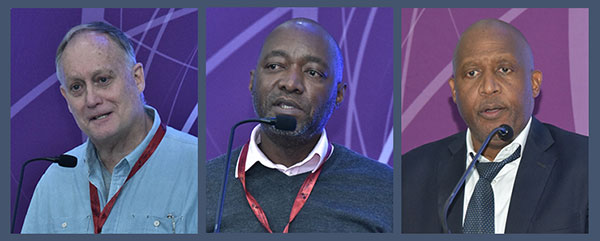
Strategic consultants and facilitators, Ian Peterson and Thabo Mogane, and keynote speaker, Dr Kennedy Dakile
The conversation centred around the institution's challenges, including staff accountability, technological advancement, and the importance of improving student enrolment, university governance, and extending financial independence and strategies for improved revenue and expenditure management. Catalytic niches were emphasised, with a call to move from concept to real sectors and invest in these areas. Challenges around staff capacity and integrating artificial intelligence (AI) for progress management were highlighted.
The keynote speaker, Dr Kennedy Dakile, provided further insights into these discussions, reinforcing the importance of innovative and strategic approaches to address Unisa's challenges and opportunities. In his address, Dakile highlighted what Unisa means in South African communities, especially previously disadvantaged areas. He said: "Unisa pioneered long-distance learning. We must preserve this wonderful legacy and ensure the university continues to define its role as an agent for a better life for all."
Dakile's presentation was themed "Victory can be achieved when you turn problems and challenges into opportunities". He encouraged the university to view the grand challenges of our times as opportunities to create novel solutions. He illustrated some opportunities Unisa can participate in, such as addressing infrastructure challenges and joining hands in employee-owned business opportunities.
Advancing from concept to action
Key areas discussed included the need for a relevant curriculum, revisiting extended programmes, improving the quality of services offered to students, providing early feedback on assessments, revisiting the mentorship programme, professionalising staff, conducting early qualifications audits, growing graduate programmes, collaborating with work-seta, fostering partnerships, encouraging student engagement in economic activities, and creating curriculums that will help shape the future.
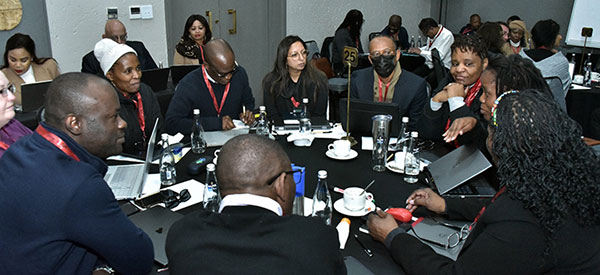
Delegates engage in collaborative discussions at round tables, contributing to the strategic vision of Unisa.
Day two commenced with a thought-provoking address by Dr Pali Lehohla. He posed the crucial question: "What does success at Unisa look like, and what are the challenges?" Lehohla emphasised that the key to greatness lies in loving the people, driving productivity and fostering intergenerational value through integrated reporting. He underscored the necessity of prioritising, maintaining or innovating programmes as part of the institution's action plan. The day's theme focused on the catalytic niches and strategies for their implementation.
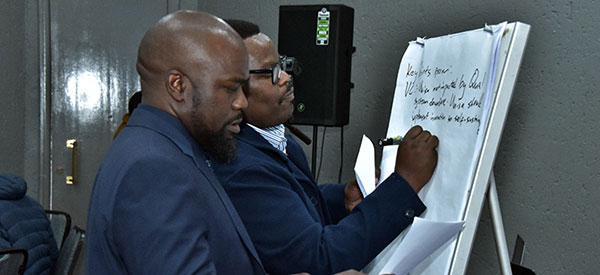
Attendees diligently script key points from the PVC's address, reflecting on the path forward for Unisa.
Presentations from various portfolios highlighted the development of catalytic niches and the implementation strategy. Colleges shared their ideas, proposals and existing initiatives. Reflections emphasised the importance of ensuring catalytic niches respond to socio-economic needs and promote community sustainability. Integration and collaboration among programmes were deemed essential.
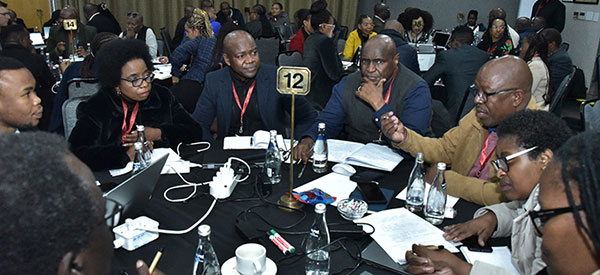
Delegates engage in collaborative discussions at round tables, contributing to the strategic vision of Unisa.
Proposals for new qualifications, such as aviation law, showcased the potential for collaboration with external sectors. Innovation, resource allocation and operational improvements were critical discussion points, focusing on enhancing the university's operations. The Unisa Women's Forum, the Academic and Professional Staff Association, the National Education, Health and Allied Workers' Union, the Unisa National Student Representative Council and the Institutional Forum contributed valuable insights to propel Unisa to greater heights.

NSRC President Nkosinathi Mabilane and President of Convocation Justice Dabampe
The two-day Lekgotla provided a comprehensive overview of Unisa's strategic focus and improvement plans. The discussions and presentations highlighted the institution's commitment to excellence, innovation and sustainable development. The focus on catalytic niches and the strategies for their implementation underscored Unisa's readiness to move from concept to action, ensuring the institution's continued success and impact.
* By Seyabonga Thipe, Intern Journalist, Department of Institutional Advancement
** Photography by Shooheima Champion, Multimedia Centre
Publish date: 2024-08-02 00:00:00.0


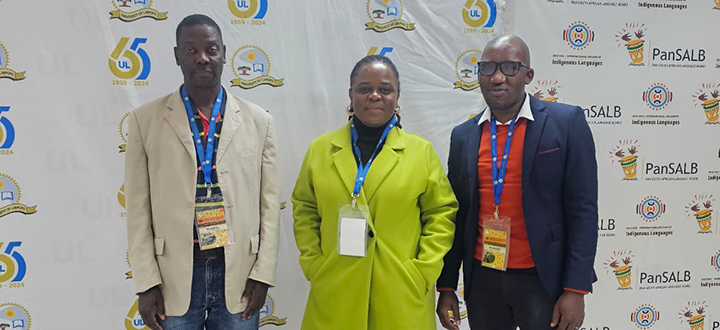 Unisa makes significant impact at ALASA 2025 Conference
Unisa makes significant impact at ALASA 2025 Conference
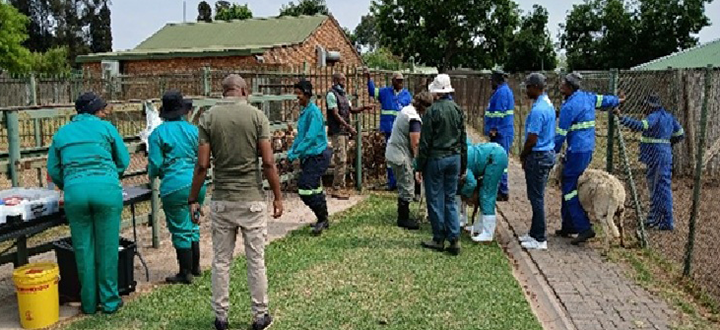 Work-integrated learning practice – extending beyond traditional distance education
Work-integrated learning practice – extending beyond traditional distance education
 Computer scientist and ICT specialist to share 4IR insights at Unisa's CNA Research Symposium
Computer scientist and ICT specialist to share 4IR insights at Unisa's CNA Research Symposium
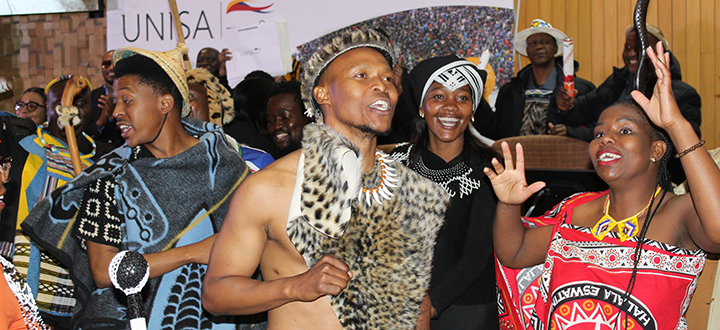 Unisa champions inclusivity with landmark language policy
Unisa champions inclusivity with landmark language policy
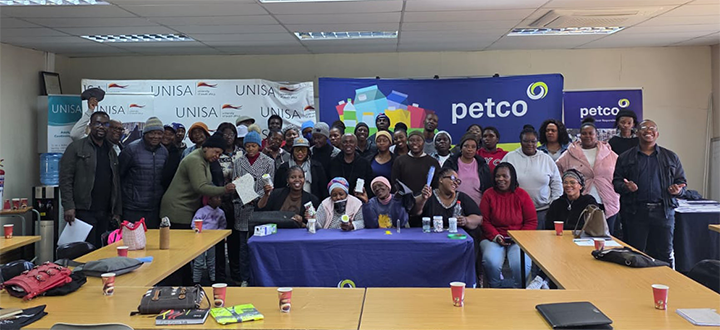 Unisa empowers Daveyton community through recycling workshop
Unisa empowers Daveyton community through recycling workshop